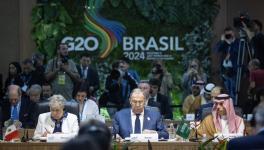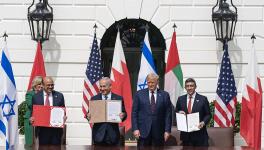Blinken’s ‘Indo-Abrahamic Accords’ Unravels
Pro-democracy protestors in Sudan, Khartoum, Oct, 26, 2021
The US Secretary of State Anthony Blinken is a man in a hurry. The president expects him to produce foreign-policy success stories.
Success stories are desperately needed as post-Afghanistan, the superpower has become laughing stock universally. The trans-Atlantic alliance is seriously disoriented and Russia is on the prowl in the heart of Europe with natural gas to sell. The Iranians are yet to give a date for the resumption of talks on the US’ return to the JCPOA.
As for China, the less said the better. The chairman, joint chiefs of staff General Milley senses a “Sputnik moment”. The Russian and Chinese warships exercise “freedom of navigation” on the forbidden seas of Japan’s eastern coastline littered with top-secret military installations.
The list goes on and on. The unkindest cut of all is that the traditional client regimes in West Asia are also asserting. They look to diversify their relations and project their power through broader alliances. And the more they look eastward, the deeper they engage with China.
Blinken must worry. The Chinese are Chinese, after all. After the US refusal to sell armed drones to Gulf states, China had a deal to set up a drone factory — the Gulf’s first — at Saudi Arabia’s King Abdulaziz City for Science and Technology.
Things came to such a pass that the Biden Administration is agonising that the sale of F-35 stealth fighter jets to the UAE risks China gaining access to some of America’s latest military technology. The FT captioned an incisive analysis of the state of play as ‘More of China, less of America’.
The FT report cited a Pentagon paper on China’s military power, released last year, which listed the UAE among countries Beijing “likely considered” as locations for “military logistics facilities”. Both Saudi Arabia and the UAE, the regional heavyweights, have taken formal steps to deepen their relations with China in recent years.
The Pentagon is also getting frantic. General Kenneth F McKenzie, the commander of the US central command, told a webinar earlier this year, “We need to recognise that competition against Russia and China simply doesn’t only occur in the western Pacific or in the Baltic, it occurs in places like the Middle East, where they are expanding and coming in.”
Blinken is trained as aide drafting memos for senators in the Congress. But all that has no relevance to West Asia with a political culture steeped in intrigues, skulduggery and cynical realism. In Blinken’s place, Jared Kushner would have found a better way to communicate with the powerful Saudi Crown Prince Mohammed bin Salman.
Blinken must be a secret admirer of Kushner to steal so sheepishly the jewel in the crown of the roving prince in the Trump White House — the Abraham Accords. Blinken simply picked up the threads where Kushner left them and strove to do one better on the Abraham Accords.
Possibly, the Israelis advised Blinken, given their own growing unease over Iran’s imminent surge with the lifting of sanctions and the US’ retrenchment upturning the regional balance.
Indeed, the strange thing about Abraham Accords is that it cannot be left unattended. A standstill would mean attrition and risks ignominy. Kushner’s original plan was that Saudi Arabia would come on board, which would have been a game changer. But, instead, a Saudi-Iranian normalisation got under way.
Credit must be given to Iranian ingenuity to figure out that Abraham Accords would eventually come to haunt the UAE. Iranian analysts saw advantages insofar as the torrid affair between the Emiratis and the Israelis that had been going on for years was at last in full public view, and the sheer incongruity of it would start worrying the Sheikhs until its legitimacy got established regionally.
Now, what better way to legitimise the Abraham Accords than by bringing India into it? The idea of a virtual meeting of the foreign ministers of the US, Israel, the UAE and India on October 18 was intended as a masterstroke. The project was hailed as “Indo-Abraham Accords” by American lobbyists.
Conceivably, India’s External Affairs Minister S Jaishankar didn’t need any persuasion. He saw another golden opportunity to cement India’s quasi-alliance with the US and to create synergy with the US-Israeli game plan to counter China’s cascading influence in the Gulf.
However, the Indo-Abrahamic Accord exposes a bloc mentality, an archaic Cold War mindset. Blinken is used to that. But the regional states have left the Cold War behind.
Unsurprisingly, the week-old Indo-Abrahamic Accord was already upstaged by dramatic developments in Sudan last Monday. Sudan can no longer reconcile with the original Abrahamic Accords.
Contradictions are galore. The military leadership in Khartoum is close to Saudi Arabia, the UAE and Egypt. The coup leader Gen. Abdel-Fattah Burhan was trained in Egypt’s military college and has made multiple visits since 2019 to the Emirates’ de-facto ruler, Abu Dhabi crown prince Sheikh Mohammed bin Zayed Al Nahyan.
The generals also get along splendidly well with China and Russia. (The Russians even swung a submarine base on the Red Sea.) Israel is hoping against hope that the generals will not give up power. Actually, as the Middle East Eye estimated, “Israel is trapped in a catch-22. situation. A military government that wants to form ties with Israel cannot deliver. On the other hand, if Sudan has a civilian democratic and free government, the chances of having peace with Israel are very slim.”
Yet, the US cannot propagate democracy in Sudan, either. The catch is, Arab Spring may well produce the very same results in Sudan as it did once in Egypt — political Islam. The Sudanese developments show the limits to the Quad-type of diplomacy that the US practises in West Asia today — ‘You’re with us, or against us.’
Simply put, the Abraham Accords has no future. Why defame the common patriarch of the great Abrahamic religions by naming a Faustian deal after him? Kushner was probably lucky to have scooted from the scene at the right moment.
Blinken is wasting time by creating cabals in West Asia. It is a hopelessly discredited strategy to somehow keep the US embedded in West Asia when its diplomacy is clearly losing traction. What happens if the clutch goes while driving?
Sudan has highlighted that there is a serious issue. What is unfolding in Khartoum is a classic symptom of a failing clutch that needs to be attended to. The military never took the 2019 deal on transition to democratic rule. Trump knew it but pretended not to notice, since the obsession was to hustle Sudan into the Abrahamic Accords. Didn’t UAE and Israel know it too? Of course, they knew.
But Blinken apparently was unaware that the Abrahamic Accords stood on weak foundations and imposing an Indian superstructure on it would be sheer madness. Sudan signals that driving with a failed clutch can be dangerous, as when a clutch goes bad, it can break apart, leaving you without a vehicle.
MK Bhadrakumar is a former diplomat. He was India’s ambassador to Uzbekistan and Turkey. The views are personal.
Courtesy: Indian Punchline
Get the latest reports & analysis with people's perspective on Protests, movements & deep analytical videos, discussions of the current affairs in your Telegram app. Subscribe to NewsClick's Telegram channel & get Real-Time updates on stories, as they get published on our website.
























